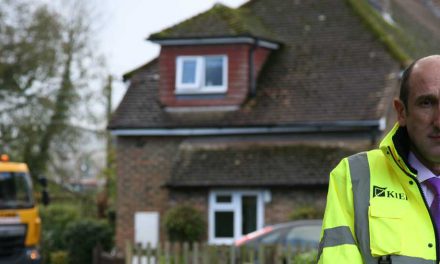Our planet is changing before our eyes.
Intense periods of severe weather are happening more often. Icecaps are melting, sea levels are rising. These are, no doubt, all things you have heard about and will definitely be hearing about more in the run up to COP26.
Climate change affects us all. It’s affecting the UK, and it’s affecting East Sussex.
In short: it’s not someone else’s problem, there are ways you can help, and we cannot afford to wait.
As a county, East Sussex has pledged to reduce its emissions by 13% each year, with a goal of being carbon neutral no later than 2050. You can read more about the council’s plan to tackle climate change on the East Sussex County Council website.

So, what’s a COP?
COP stands for ‘Conference of the Parties’. It’s a global summit that has met nearly every year for the past three decades to discuss how to tackle climate change. COP26, starting on 31 October, will focus on accelerating action towards the goals of the Paris Agreement and the UN Framework Convention on Climate Change as the need for action becomes more urgent.
Climate change: how can you help?
While there are big discussions going on between those that make the decisions, there are also smaller things we can all do. It won’t just be down to big, top-level changes to slow down the effects we are having on our planet.
“In a world of more than seven billion people, each of us is a drop in the bucket. But with enough drops, we can fill any bucket.” – David Suzuki – academic, science broadcaster and environmental activist.
Or, as Tesco tell us, every little helps.
And you don’t have to do it alone. All over East Sussex people are working together to help tackle climate change. From tree-planting initiatives, to resources to help you make your life plastic-free – there’s a lot out there to help you take a few steps in the right direction.
Check out these amazing local groups and resources, and find out what you can do:
Treebourne
Eastbourne-based organisation Treebourne’s mission is to double tree cover in the town by 2030. They are working to find sites in the area where trees can be planted, and often have events at which you can get involved in the action.
Find out more about their work and how you can support Treebourne on their website
Why more trees?
CO2, or carbon dioxide, is the biggest offender when it comes to climate change. Trees naturally remove CO2 from the atmosphere through photosynthesis.
More trees = less harmful gases
Read more about why trees are important on the Woodland Trust website.

Go plastic-free
These groups in Seaford and Eastbourne are working with Surfers Against Sewage to help people stop using plastic.
There are five objectives that Surfers Against Sewage qualify as the criteria in getting towns to successfully become plastic-free. Once they have been achieved the town will be awarded the ‘Plastic-Free Status’ (similar to the FairTrade model).
To find out more or get involved you can visit the websites for each organisation at: Plastic Free Seaford and Plastic Free Eastbourne.
For tips on how to cut down, you can also check out our article on how to ban plastics from your home.
Why less plastic?
There are many reasons why plastic is bad for the planet. Plastic waste in our oceans and landfills, coupled with poorly regulated incineration practices in other countries, pose considerable threats. As the planet gets hotter, plastic in our environment breaks down into more methane and ethylene and increases the rate of climate change.
Less plastic waste = less harmful gases = less damage
Transition Town Hastings
Part of the Transition Network, Transition Town Hastings focuses on a broad variety of projects with the aim of addressing, as a community, the global challenges we face. By coming together locally and crowd-sourcing solutions they seek to nurture a caring culture, focused on supporting each other to do better.
One of their most recent initiatives saw residents come together to create a series of wildflower meadows, with the aim to create beautiful and biodiverse spaces for the local community and wildlife.
Find out about upcoming projects and how to get involved at the Transition Town Hastings website.
Why wildflowers?
Much like trees, flowers and green spaces help us tackle the dangerous levels of CO2 emissions in our atmosphere. They also encourage bees, insects and other wild animals to flourish in the area. Protecting and restoring biodiversity is the most efficient and cost-effective step we can take to stabilise the climate emergency.
More plants and animals = more biodiversity = a more stable environment
These and many other organisations in East Sussex are looking for people like you to step up and help. We will be publishing more articles over the coming weeks with a focus on changes, large and small, we can all make to help tackle climate change – so keep your eyes peeled!






